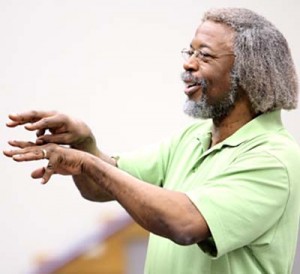Jim Gates
“Jim” Gates; from MIT to presidential science advisor
For RRTN by Tristen GravesHe didn’t suspect that it would lead him to become a theoretical physicist, educator and member of the president’s council of science advisors.”No one had been in space at that time and I was fascinated by the idea that you really could not do anything like that without science,” Gates said during a telephone interview.
Gates, 59, is the John S. Toll professor of physics and director of the Center for String and Particle Theory at the University of Maryland at College Park, where he has taught since 1984.
In 2009 he joined the Maryland State Board of Education and was appointed by President Barack Obama to the President’s Council of Advisors on Science and Technology.
In addition to own discovery of science, Gates credits his family, especially his father, Sylvester Gates Sr., with providing the foundations of his success.
life, do something you love to do.”
–Jim Gates
He said he was reminded of how his father laid the foundation for self-determination when he saw the brick bearing his father’s name on an Orlando, Fla., monument to World War II veterans.
Gates began his studies of elementary particle physics and quantum-field theory at the Massachusetts Institute of Technology, where he received his Ph.D. in 1977. He earned MIT baccalaureates in math and physics in 1973.
Sylvester James “Jim” Gates Jr. says he knew by age 8 that he had a passion for science.
He taught at MIT in the early ‘80s and joined the University of Maryland in 1984. He was away from Maryland for two years in the ‘90s to be physics professor and department chair at Howard University.
In his doctorial dissertation, Gates became the first to take on the topic of supersymetry, a theory that posits a marriage between the universe’s particles, like electrons, quarks, protons neutrons, and forces the forces that bind them, like gravity and electromagnetism.
He shares his enthusiasm for science. Through speaking engagements, school visits, and his journals, Gates promotes science education and helps shape the lives of future minority physicists. Many know Gates and his take on physics from his appearances on TV’s NOVA programs on PBS, especially 2003’s The Elegant Universe.
“I tell them what I have seen and my own experiences,” Gates said.
Overcome negative intellectual expectations
“We seem to be evolving in a society where we seem to be losing the interest of our own young people,” said Gates. “If you look at the impact of science on our culture, it is subtle but important.”
African-Americans must overcome negative intellectual expectations, he says. In an article on the Science magazine web site, Gates said that historically black colleges and universities should consider the increasing importance of mathematics, engineering, technology and science to the welfare of African-Americans. Doing so would “bring our own voice to the fields in the same way that we have brought our voice to music.”
He said that as a new member of the president’s science council, he plans to bring diversity issues to the table along with his experience with international science and policies. Gates chairs the council’s working group on science, technology, engineering and mathematics.
He said imagination is the driving force behind what he has accomplished and embraces Einstein’s statement, “Imagination is more important than knowledge.”
“You cannot grow new knowledge unless you have imagination,” Gates said.



One Response to Jim Gates